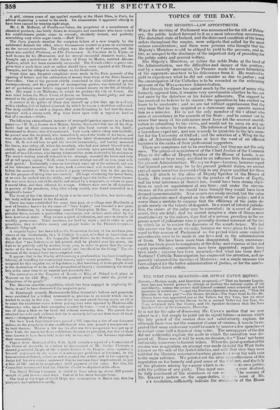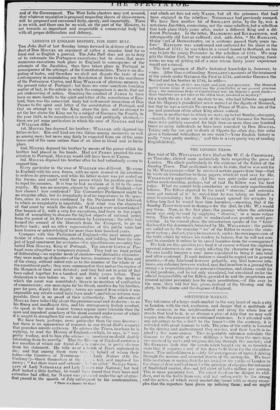THE \VEST INDIA QUESTION—MR. OTWAV CAVE'S BIQTION.
Slavery,—Motion made, and Question proposed,—" That no human Legislature has any lawful power to abridge or destroy the natural rights of life and liberty, unless the owner shall himself commit some criminal act that amounts to forfeiture : "—and the Previous Question being put, "That the Question be now put :"—The House divided—The Noes went forth—Mr. Otway Cave was appointed one of the Tellers for the Yeas, but no other Member remaining in the House to be a second Teller for the Yeas, the Noes returned into the House, and Mr. Speaker declared that the Noes had it.—Votes of Me Commons, Thursday.
IT is not for the sake of discussing Mr. CAVE'S motion that we now advert to it ; but simply to point out its signal failure—a failure which the late period of the session does not satisfactorily explain, for although there was not the remotest chance of success, it was to be expected that some endeavour would be made to muster a few speeches or to collect some half a dozen of stray votes. The newspapers of the day did not sufficientiy explain the mode in which the resolution was disposed of. There was, it will be seen, no division, the "Yeas" not being sufficiently numerous to furnish tellers. When the great quest ion of the session was in agitation, an attempt was made to inlist the West India interest on the side of the Anti-Catholics, and with that view they were told that the Ministry entertained certain plans tlist were big with ruin to the sugar colonies. We pointed out the utter groundlessness of this imputation on the honesty and good sense of the (7;0 :inet, and the folly
of the planters mixing up a cause which is :u its own justice, with the politics of any party. They must now . .1'y ever doubted,
be fully convinced of the soundness of our ati • .• 'The essence of Mr. GRANT'S motion on the sugar-duties, tai:•, .:re issue of Mr. E'S resolution, sufficiently indicate the sent:tit=ts of the House
and of the Government. The West India planters may rest assured, that whatever regulation is proposed respecting slaves or slave-owners, will be proposed and canvassed fairly, openly, and impartially. There is no wish, and there can be no wish, on the part of the Ministry, to act towards so important and respectable a commercial body but with all proper deliberation and delicacy.



















 Previous page
Previous page